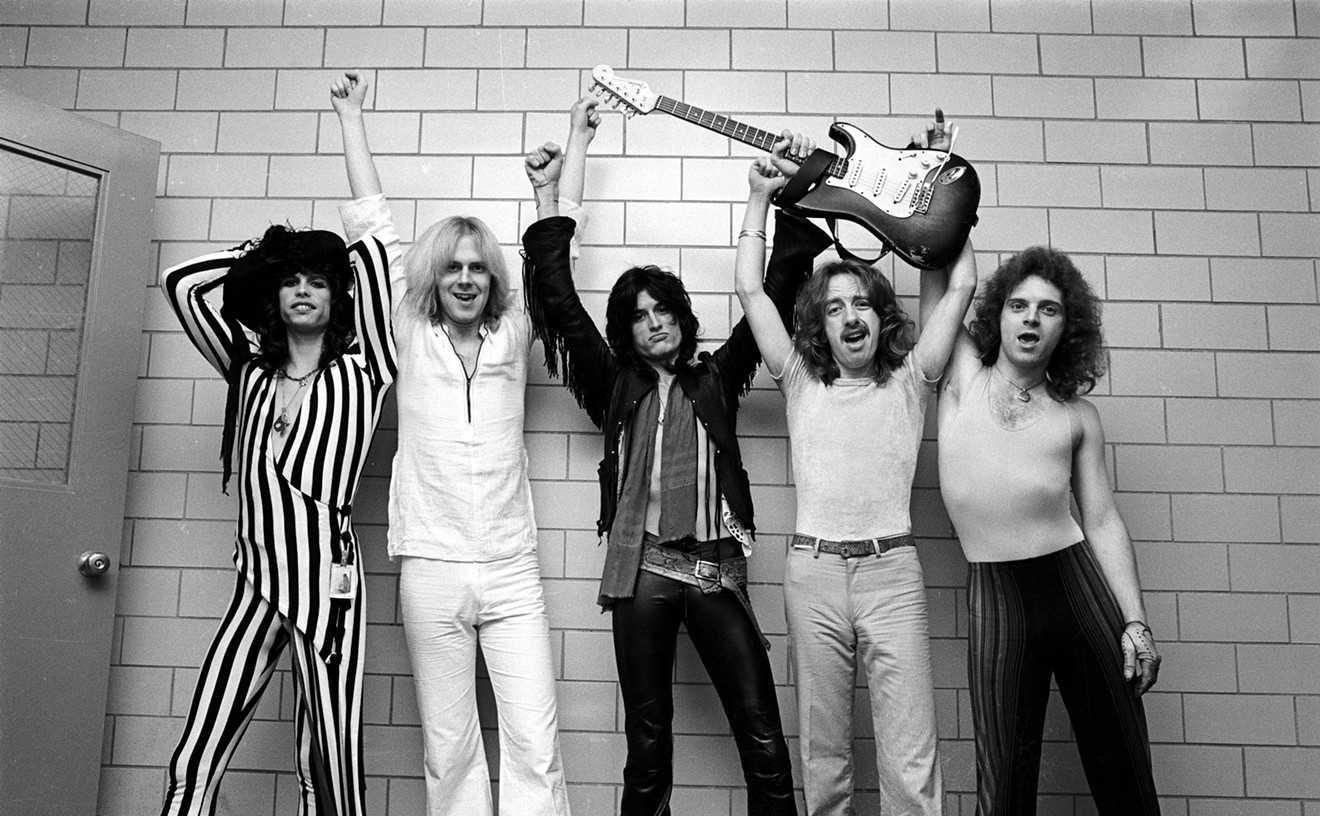Billie Maxwell's "Cowboy's Wife" is one of those subtly powerful songs that leave you haunted and still.
Recorded in 1929, the track depicts the day-to-day toils of its protagonist, a woman living a tough life in the mountains of eastern Arizona.
Maxwell sings sorrowfully about a scene in which she prepares supper and waits for her cowboy husband to return home from a drive. She hears his familiar approach, saying she can "place every sound" while he dusts himself off and makes his way inside. Finally, he sees her after both of them have experienced a long, tiring day.
"I almost hold my breath / For in my heart I am hoping / That he'll notice my new jean dress / He comes, but his eyes wander past me / As he greets me with a kiss at the door / And I know that he's wanting his supper / For I've been through the whole thing before," she sings. "I place the hot supper before him / Oh, yes, I shall surely do my part / As I swallow my own disappointment / For I know that's the way to his heart."
It's sung in a minor key and with despairing and heartbreaking vocals that indicate deep convictions. Maxwell, singing in the voice of the title character, epitomized the Western woman — hardworking, strong, and independent but family-oriented and uncomplaining, to the point that she sacrificed her own happiness and contentment for some implicit greater good.
Remarkably, this beautifully dark song of swallowed discontent was recorded in the summer of 1929 — only nine years after the 19th Amendment gave women the right to vote. It would be difficult to find other recordings from the era expressing the same sentiments — perhaps with the exception of protest songs written during the suffrage movement — and impossible to find one from the still-wild West.
So it's no wonder that John Dixon desperately wants an original copy of Maxwell's record. Dixon has been a career record collector (yes, there is such a thing) for 15 years, and is considered by the Arizona Blues Hall of Fame to be the "unofficial Arizona music historian." Dixon is in his mid-60s and tall, with grayish-white hair and a mustache and beard to match. He has a vault of vinyl and often dons record company T-shirts to wear with his jeans or shorts. He's always up for a good conversation, which he endearingly peppers with words like "kiddo."
Dixon is a pro, and when he seeks out an album, he likely will get his paws on it.
But Maxwell isn't your average "find" — she's the godmother of cowgirl music, the earliest recorded Arizona musician, and arguably one of the first feminist singers.
So her records are extremely obscure and extraordinarily important. And very elusive, even for a guy like Dixon. In seven years of searching, the closest Dixon came to getting a good copy came when he paid nearly $400, only to receive the disc cracked in the mail — a not uncommon fate for 78s, pre-vinyl discs meant to be played on the Victor Victrola.
Though the man known around town as "Johnny D" is an expert on Arizona music history, Maxwell isn't an artist he discovered on his own. Actually, he was turned on to her by longtime Tucson musician and KXCI community radio jock Al Perry. Perry, likewise, is on a hunt for Maxwell's record.
"I found [this] book Classic Country: Legends of Country Music at some sorta 'Friends of the Library' sell-off," Perry says. "It was only a dollar. I about popped a cork when I later read it and discovered the chapter on her."
As it turns out, few, including experts on Arizona's music history, had heard of Maxwell. Very little has been written about her, despite the fact that the few recordings she made in the late '20s are some of the most interesting artifacts in Arizona's cultural history.
What makes Maxwell's music, especially "Cowboy's Wife," so compelling is its outspoken, unpolished sound and lyrics that come from a blue-collar woman's point of view. Such a thing was unprecedented in the West.
"'Cowboy's Wife' is great because it's some sorta proto-feminist anthem," Perry says. "It's in a minor key, which is unusual, and her amateurish, quavery voice is pretty compelling. All those things make it a pretty unique record."
So who was the woman who recorded it?
Billie (sometimes spelled "Billy") was born in 1906 and named Willie Maxwell after her grandfather William Beatty Maxwell. It's unclear where she was born — this was, after all, six years before Arizona became a state. She grew up in a town called Nutrioso, in the White Mountains near Springerville. Her family worked as farmers and ranchers and also passed down a strong musical tradition.
Billie's niece, 76-year-old Pat Simpson, remembers her aunt's musical career well.
"The family was musical. It goes back three or four generations, to my great grandfather. He had 28 children, and every one of those children played a musical instrument," she says. "My father [Billie's brother Marion] played violin, banjo, guitar, ukulele, and mandolin. Aunt Willie played guitar, and piano, and so forth.
"And so they had what they called the Maxwell Family Orchestra," she says with a smile. "I have to laugh when I see that term, because there was only four members, and actually what it was was a hillbilly band. To call it an orchestra, I think, was overstating it a little bit. None of that music has been written. It was just passed on from one generation to the other."
This "orchestra" comprised Billie, her father, E. Curtis Maxwell, her uncle Frank, and her brother Marion. While the Maxwells' music was a part of daily life, so was the lifestyle that informed it. Billie wrote about Western life from a little-heard perspective: She was an authentic cowgirl, unlike other early country artists, who merely imitated the lifestyle to further their image.
There may have been more like her, but they never made it to wax. Not surprising, given the difficulty in making these recordings. Even now, life in the mountains of eastern Arizona can be tough and isolated. The Maxwells would know — to date, the family has been living there for at least seven generations. It's hard to imagine what people in the '20s would have to do to get their songs pressed into a record.
Simpson finds it hard to describe, and she was there.
"We lived a kind of a — you would have to have lived then, because there's no longer anyone living the kind of existence that we lived — I guess we were hillbilly," she says, almost surprised. "Just people taking care of each other, very poor, not having a lot of money . . . We had to raise all the food we ate, there were no supermarkets or anything. And [Billie] was born in that kind of environment."
Given that they couldn't drive down the street to buy food, you can only imagine what was involved in making a record. First, the Maxwell family auditioned to record with the Victor label, which later became RCA Victor, and was accepted. They had to go to El Paso to make the record, which was not an easy task, given the rugged landscape and primitive transportation in a small town in the late '20s.
The drive from Nutrioso to El Paso today takes about 5 1/2 hours. That's in a comfortable, air-conditioned car with sophisticated tires gliding over asphalt. Billie's drive in 1929 would have been closer to what you see in the old Oregon Trail video game, along roads that were shared by both cars and horses, in a vehicle that likely didn't go faster than 30 miles an hour when it wasn't overheating or getting a flat. Oh, and you'd better fill up when you could, because there weren't gas stations on every corner back then.
"By the time they got there, they were almost broke," Simpson says. "After several breakdowns, and flat tires, and running out of gas, and having nothing to eat, and so forth."
Ultimately, the White Mountain Orchestra, previously called the Maxwell Family Orchestra, recorded four songs. Billie was asked by Ralph Peer, a well-known producer who had also made a number of field recordings in the South, to record some of her own material. What resulted were three solo discs with two songs each, which are now the object of Johnny D and Al Perry's quests.
Those brittle old records are even more interesting because they are some of the only evidence we have of such music. The Maxwell family was not formally trained — or educated past eighth grade — so their music isn't written anywhere. Recording was far out of reach for most, so songs were passed down through the family through an aural tradition. Then, when they were recorded in a studio, only a very few copies were pressed. Oh, and 78s broke easily.
Given all that, it's clear why the albums are so hard to find, and why people like Dixon will pay so much for them.
"[The records] were distributed mostly in the major markets, and they didn't make that many 'cause they really weren't hits," Dixon says. "They probably made between 1,000 and 2,000 of each of these records. They're 78s, so a lot of them have been cracked, busted, or whatever over the years. They made so few of them that I wouldn't even venture to guess how many still exist. Maybe there are only 20 copies or something. [But] it only takes two people to drive the price of the record up."
Still, for someone like Johnny D, owning that artifact is a worthy quest. It's not that they can't hear the songs otherwise — in fact, we've got tracks from Maxwell for readers to listen to at PHXmusic.com — it's just something about owning that piece of history.
"Number one, she's the earliest Arizona recording artist that I know of. So because I collect Arizona records, that makes it unique to me," he says. "I think I read somewhere that she's credited as being the first country girl singer. So that, to somebody else, might be the more interesting thing. Or maybe they're making a run on Victor records. For me it's just that she's got an Arizona connection."
Whether it was obvious or not at the time, what Billie Maxwell did was pave the way for women in country music. Not only was she able to be taken seriously as a musician and singer at a time when many women weren't, but she articulated the struggles of working-class women from an honest and forthright perspective, years before pioneers like Loretta Lynn were even conceived.
Johnny D also points out that Maxwell didn't receive recognition or appreciation for her work aside from the audiences at the dances where her family played, and she probably never heard herself on the radio. (There weren't likely radio stations in the White Mountains at the time.) Though Simpson said that the family was given some recordings to distribute to friends, any that were in the family seem to have been lost. Simpson knows of a few people who own some of these records, but when she tried to buy them, the owners wouldn't part with them.
Maxwell died of a rare cancer at 48, but in her short life, she and her modest family — the First Family of Arizona music — came to represent an important part of the cultural milieu that is Arizona. They worked the land, played at community events and dances, and passed their music down through the generations — all the way down to guys like Johnny D, who feel the connection despite living a very different life a few hundred miles west and several decades later.
Simpson, of course, feels that connection, too. Like Dixon and Perry, she'd love to get her hands on a copy of her aunt's record.
For now, her connection is in a purely aural form, like most of the songs her aunt and her family sang. Likewise, that connection can take on a fleeting physical manifestation from time to time. Simpson obviously beams with pride knowing that Maxwell's story, the story of a heartsick but dedicated cowboy's wife raising her voice in El Paso, will be told in pages that'll quickly yellow and be discarded like so many cracked 78s.
Simpson shows those feelings much as her aunt did in song — a subtle glimpse into deep desires, delivered with humility but with great sincerity.
"To me, it's delightful," she says. "I love to read about things like that."










